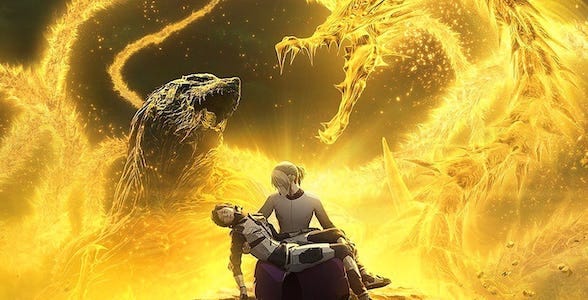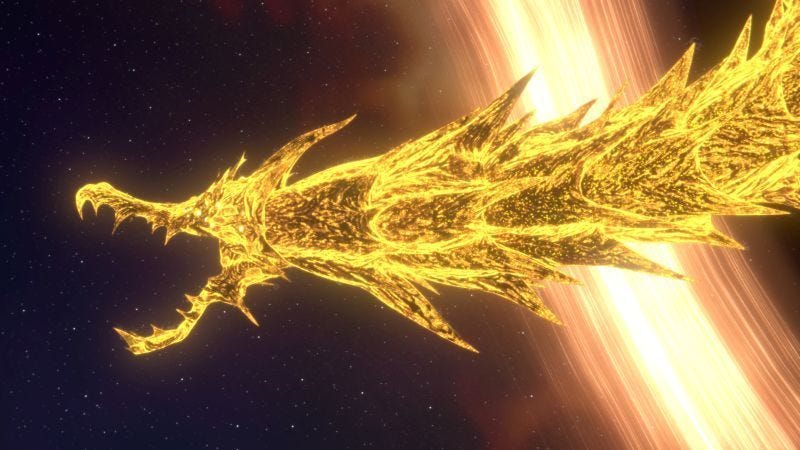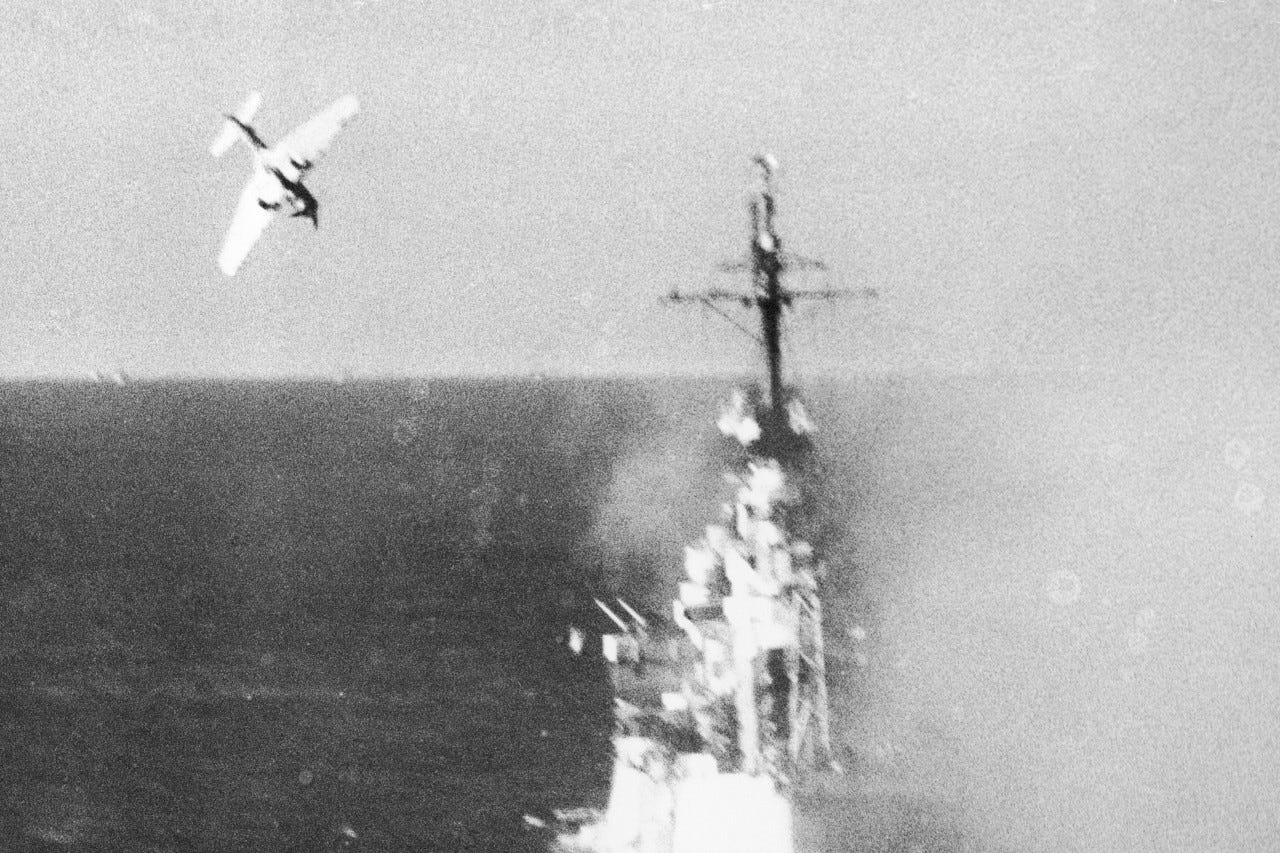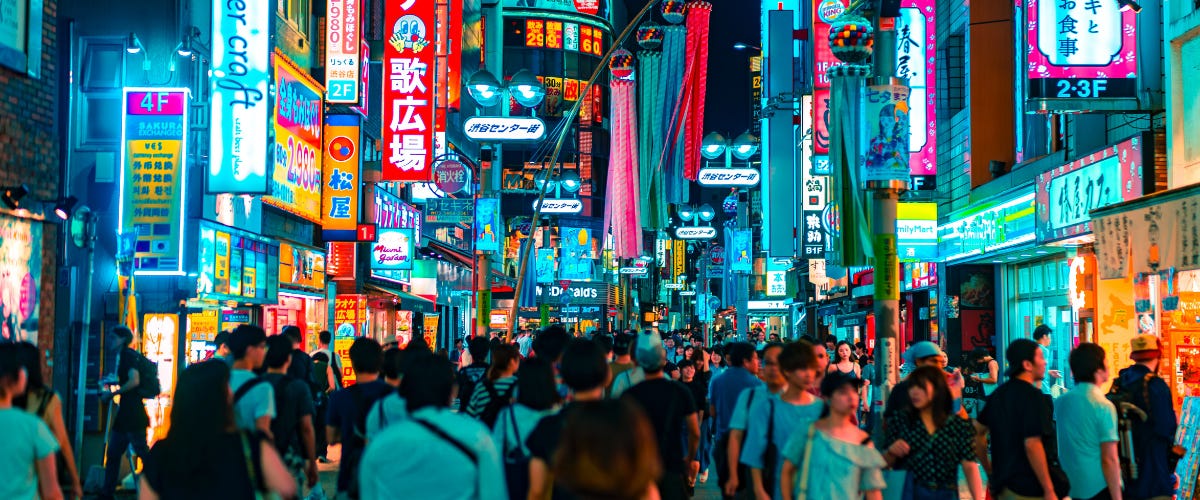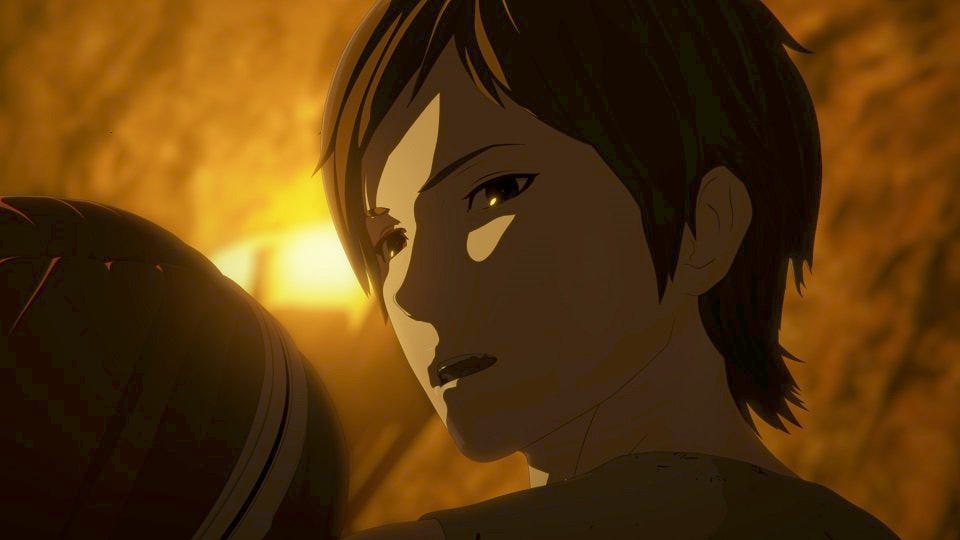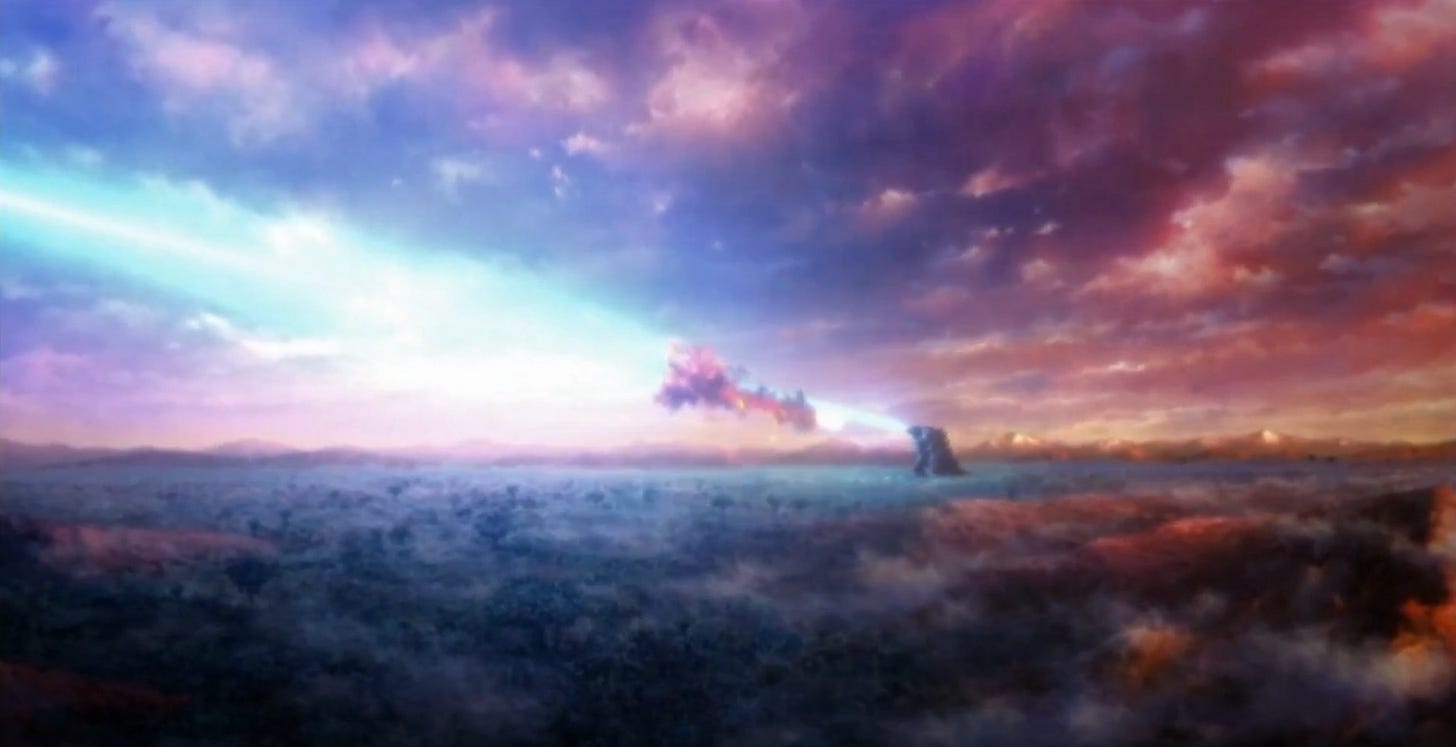It was a surprising finale.
Capt. Haruo Sakaki, coming off a victory against King Ghidorah, has a premonition. If he sticks around, his disdain for Godzilla will fuel the three-headed monster's return. To ensure he and others are never used as vessels for King Ghidorah's resurgence, Haruo ends his life with a defiant kamikaze into Godzilla. A generation later, the descendants of mankind offer trinkets, representing negative feelings, at an altar honoring Haruo. Humanity, as it now exists, is free of wrath.
For all the controversy Godzilla: The Planet Eater (2018) has caused, the ending is something of a high point. After experiencing Metphies' existential condemnation of humanity, Haruo takes on the burden of its rage and buries it with him. It's a fitting end for a walking manifestation of fury. And then fan discourse delivers the following critique:
“...the last movie in the anime trilogy [Godzilla: The Planet Eater] is pro-suicide.”
Never resign yourself to a boring day, I guess. Who said this is irrelevant, but it paints screenwriter Gen Urobuchi as an advocate for the most lethal outcome of mental disorders. It's nothing to brush under the rug, and I was quite shocked by the comment.
This isn't like criticizing Godzilla: King of the Monsters (2019) for pro-nuclear ideas. Tone-deaf or intentional, pro-nuclear advocates are widespread, even within the fandom. Whether filmmakers think nuclear weapons can save the world, or are just clueless, it's easier to believe a storyteller could support that power over suicide. To assume a film is intentionally praising suicide is unlike anything I've encountered. It was an incredible charge, and although my knee-jerk reaction is to disagree, I was too fascinated to dismiss it completely.
Moving forward, it's important to remember and accept that Godzilla and The Planet Eater are, and forever will be, Japanese. There's no way around it. Whether it's Jun Fukuda's Godzilla vs. Megalon (1973) or Akira Kurosawa's Stray Dog (1949), foreign audiences will miss some form of cultural context in Japanese cinema. On the topic of suicide, Japan's attitude is admittedly complicated.
Japan has been referred to as “suicide tolerant”, influenced by seppuku, the form of ritual suicide among samurai dating back to the 1400s. [1][2] Additionally, World War II's kamikaze pilots are painted as another symptom of honorable suicide, likely inspired by the age of the samurai. [3] However, the influence of these acts gets murky amongst scholars. “These phenomena were almost certainly not perceived as suicide by Japanese at the time,” explains Dr. John Traphagan of religion and population research, “bombers are seen by some members of their in-group as having selflessly sacrificed themselves in defense of the community and its way of life—not unlike soldiers who die in battle.” [4]
While Traphagan attempts to create a distinction between suicide and sacrifice, Japanese scholars emphasize their cultural view on the topic in another way. “Here suicide is not a sin,” explains Wataru Nishida, a psychologist in Tokyo. “In fact, some look at it as a way of taking responsibility.” [3] Indeed, suicide is often seen as an act of alleviating the burdens of close ones and family, financial or otherwise. Still, the leading cause of suicide in modern Japan seems to be the same as in most cultures. Let it echo across the world; depression is a serious condition. [1][3][4]
“Not everyone who is depressed is suicidal, but everyone who is suicidal is depressed,” Bill Delvaux of Landmark Journey Ministries insisted. [5] Perhaps scholars use the term 'suicide tolerant' too carelessly. “No one wants to die,” added Scott Green, a state counselor, “they just want to stop feeling.” Green advocates that depression is a biological issue, and the delineation between 'mental health' and 'physical health' will close as it's taken more seriously in the future. [6]
Japan's mental health has been at an all-time low since the 1980s. Although the country began taking the subject more seriously when suicide rates spiked in the 1990s, the demand for mental health professionals supplied the country with many individuals unqualified for the job. [1][3] As the country lags in adequate mental health resources, all manner of financial pressure, isolation, and bullying have contributed to an average of 30,000 lives lost per year. In contrast to seppuku and kamikaze, the country considers these losses a significant issue.
To consider Haruo's death with Japanese cultural and ethical standards makes sense, but Western civilization has also blurred the line between suicide and sacrifice as far back as its most revered myths. Judeo-Christian tradition reviles ending one's life, any life, but there's discourse to be had over Christ knowing he was going to die when surrendering himself to Roman guards for the greater good. The Western acceptance of taking one’s life for the sake of many is popular in even the most mainstream stories. Spock walked into a no-win scenario, which saved the Enterprise in Star Trek II: The Wrath of Khan (1982). (Of course, he was revived by the next movie.) Bruce Willis sacrifices himself to prevent mankind's extinction in Michael Bay's Armageddon (1998). These stories celebrate noble, selfless sacrifice despite characters willingly ending their lives. So the question is, does Haruo’s end align more closely with a Christ-like sacrifice or an act of despair?
The Houtua, the surviving civilization on Earth, had no word for 'hate', and the remaining humans were happy to be assimilated into their harmonious culture. They viewed Godzilla as a natural disaster—an entity that can cause harm but co-exist. Haruo, however, harbored chronic, aggressive animosity for the Monster King. This same loathing is what brought King Ghidorah to Earth. If he were to stick around and pass his enmity to the Houtua culture and future generations, the cycle of extinction might start again. King Ghidorah was a physical manifestation of his hatred; an eldritch creature built from abominable fury that literally consumed the last of humankind. To save future generations, Haruo plunged the remnants of bolstering human rage straight into Godzilla's beam. With his sacrifice, King Ghidorah would no longer return, and the Bilusaludo’s nanometal could not be used to revitalize human arrogance to control something that can't be controlled.
The removal of nanometal could be viewed as anti-progressive or anti-technology, but it could also be seen as the progression of another kind. The Houtua worship Mothra because they trust her and find comfort in her. She's the only monster not being used to justify negative attributes--like Haruo's hatred, the Bilusaludo's arrogance, and the Exif's nihilism. Mothra's existence did the one thing humanity has always needed to understand each other better--help the Houtua communicate. She was the antithesis of all of the other ‘gods'. Unlike Godzilla, MechaGodzilla (City), and King Ghidorah, she never got physically involved. She was above all of that, and her role as a mediator for clear communication was what saved the day. If Mothra’s role is to encourage communication that omits ‘hate’ from the vocabulary, Haruo sticking around would've infected that vernacular. So he took himself out of the equation, asking Godzilla to take all his hate as if praying to his god.
The idea of bearing humanity’s hateful aggression and burying it in death certainly has a whiff of Christ-like symbolism. “Who his own self bare our sins in his own body on the tree, that we, being dead to sins, should live unto righteousness: by whose stripes ye were healed.” (1 Peter 2:24) [8] (Insisting the cross is a tree also brings to mind an amusing comparison to Haruo, who died via Godzilla—an iteration with plant-like origins.) Or, perhaps Haruo’s sacrifice ebbs closer to Mr. Nishida’s more Eastern notion of taking responsibility. Japan Helpline’s Ken Joseph's experience echoes Nishida’s evaluation. "There is sometimes an intolerable pressure on the elderly that the most loving thing they can do is take their lives and thereby provide for their family.” [3] Although Haruo wasn’t elderly, he was burdened by the weight of his unsatiated animosity.
Like Japan, I suspect the Houtua don't have many able counselors to combat depression, but the fact that Haruo couldn't find a way to outlive his hate speaks to a more practical issue. “The actual courageous thing to be done in that situation is to try to understand your hate. Learn to work through that. Come to a place of understanding,” David May, of The Drift Space Podcast, aired his grievances with Hauro. “[The Houtua's] entire religion is about seeking to understand. And you would think a little bit of that would've rubbed off on him.” [7] To that end, his suicide run could be perceived as a despondent act.
Granted, storytellers need to be careful. Urobuchi is known for offing his characters and taking their own lives isn't new to him. Hell, Haruo isn't even the only character who ends his own life in the anime trilogy. If there's even a question that a story could be pro-suicide, then something may not be working. Although Haruo's sacrifice works as a poignant analogy, it leaves something to be desired on a practical level. He left the mother of his unborn child behind, which is problematic enough, and his sacrifice insinuates he was the only human left with a sense of ill will toward Godzilla. It's a stretch. Moreover, it hints at a breakdown in mental health.
The unfortunate truth, however, is that not everyone is successful in working through their problems. Some believe taking their life is an adequate answer to many situations, no matter how hard they try. Well-intentioned narratives aside, martyrs and sacrificial lambs should not have to exist. No one should be encouraged to take up such a mantle. No story should influence that act. To assume that is the point is to miss the forest for the trees. It is best to look at Haruo's act as a plea for life. An analogy condemning the worst of human tendencies to ensure a better future. May that future include a world free of self-destruction.
---
If you are feeling hopeless or believe you are in danger of self-harm, please reach out to a loved one or contact the Suicide & Crisis Hotline Lifeline at 988.
---
[1] Japan Today - The complicated concept of suicide in Japan
[2] History - What Is Seppuku? The ritual suicide originated in Japan's ancient warrior class.
[3] BBC News - Why does Japan have such a high suicide rate?
[4] The Diplomat - Japan’s Suicide Problem: Searching for Answers
[5] Interview with Coach Delvaux
[6] Interview with Scott Green
[7] The Drift Space – Episode 31 – Godzilla: The Planet Eater
[8] The Holy Bible - King James Version - 1 Peter 2:24





